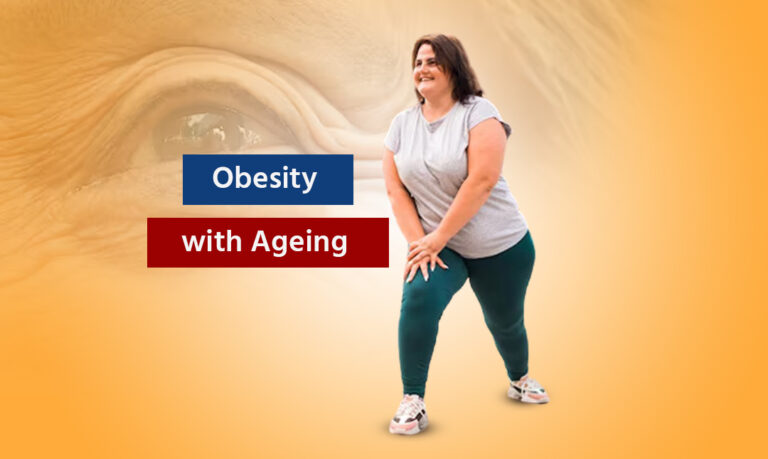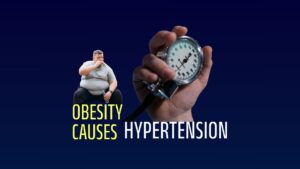
Vidhi Dave
Bariatric Dietician & Content Writer
Obesity with Ageing

The elderly population is growing globally, with people aged 65-80 years being the most rapidly expanding segment, owing to advancements in healthcare management that allow for increased life expectancy.
A global obesity epidemic is increasing as a result of life changes such as lack of physical activity and high-calorie diets, supporting the emergence of noncommunicable diseases.
Causes:
We lose muscle mass as we age, especially if we are sick and are not physically active. It is replaced with fat. Although our BMI may not vary, our fat reserves do, and with them, our risk of developing obesity and its associated disorders.
Natural hormone fluctuations have an impact on weight, especially in menopausal women. Men also start producing less testosterone, the hormone that regulates fat distribution and muscular mass.
As we age, our metabolism naturally slows, requiring us to eat less or consume fewer calories.
We become less active and sometimes more stressed as we become older. This can indicate that we spend too much time at home alone. Additionally, sometimes you might feel more stress at home about family issues, about health or something or other, which can lead to weight gain.
Significant changes in lifestyle might also affect weight growth. Maybe you used to spend an hour a day at the gym, but now you use that time to stand in line to pick up your granddaughter/ grandson from school.
Consequences:
Obesity in old age can lead to potentially serious health issues, especially if it is ignored. Obesity and aging are both important risk factors for the development and progression of a number of chronic/noncommunicable diseases, including metabolic syndrome, Insulin Resistance (IR), Type 2 Diabetes (T2D), sarcopenia, and frailty.
Metabolic syndrome is defined by the World Health Organization (WHO) as a pathologic state characterized by obesity (BMI 30 kg/m2), IR, hypertension, and hyperlipidemia. T2D is an IR characterized by reduced pancreatic insulin output. Frailty is a clinical phenomenon that occurs in the aged and is associated with an increased risk of poor health outcomes, falls, event disability, hospitalization, and mortality. Some of the negative repercussions that elderly face include:
Obesity increases blood pressure and aberrant lipid levels, particularly cholesterol, thereby raising the risk of coronary artery disease and stroke.
Obesity affects how insulin produced in the body is used to maintain blood sugar levels. This is because the high fat content inhibits the effective utilization of insulin, increasing its ability to resist and raising blood sugar levels, resulting in diabetes.
The likelihood of developing certain types of cancer, including those of the uterus, breast, colon, liver, pancreas, cervix, gallbladder, kidney, pancreas, and prostate glands.
Obesity impairs digestion. This causes heartburn, liver problems, and gallbladder illness.
Most obese seniors suffer from major sleep disorders such as sleep apnea, in which breathing repeatedly stops and resumes throughout the sleeping period.
Obesity causes increased stress on weight-bearing joints and increases inflammation in the body. These risk factors can lead to joint stiffness and osteoarthritis.
Because it releases hormones and substances that encourage inflammation and insulin resistance, visceral fat, commonly referred to as belly fat, can affect the brain. Therefore, having too much belly fat can raise your risk of getting diabetes. It has also been proven to be a valid warning sign of cognitive deterioration in elderly diabetics.
How to prevent weight gain?
Regular physical activity is essential to prevent weight gain. Moderately intense physical exercises are especially helpful in achieving this goal. Elderly people can work out for roughly five hours per week to achieve this. In addition to exercising, elders should be physically active by performing as many of the daily duties independently as they can. Natural anti-inflammatory foods, such as ginger, berries, and broccoli, help older people feel better and motivate them to move around more.
Maintain a healthy diet: One of the most important ways to prevent obesity is to eat a balanced, healthful diet. Fresh fruits, veggies, and whole grains are among the healthiest diets for seniors since they are high in nutrients yet having a low calorie count.
A high-protein diet is also advised for senior citizens since proteins are necessary for body cell repair and serve as the building blocks of bones, muscles, cartilage, and skin. Lean meats, eggs, dairy products, and pulses are a few foods that are enhanced with protein. Similarly, because millets like ragi, jowar, and bajra are a rich source of vital vitamins, minerals, and antioxidants, their importance and advantages cannot be overlooked.
Also for someone with a BMI more than 30 for them Bariatric surgery is the only line of treatment. i.e Body Mass Index. Identifying one’s present health status and body mass index (BMI). Body Mass Index (BMI) is a measurement of a person’s weight with respect to his/her height.
Based on the patient’s BMI, medical history, diet history and by performing some tests, a bariatric surgeon will choose which procedure is ideal for each individual patient.
Aastha Bariatric is the Centre for Metabolic and Bariatric surgery. At Aastha Bariatric, we provide our patients with comprehensive information about bariatric surgery, including its risks, benefits, the recovery process, and what they can expect post-surgery. Our commitment is to be compassionate, patient, available, informative, and supportive advocates for our patients throughout their bariatric surgery experience.






